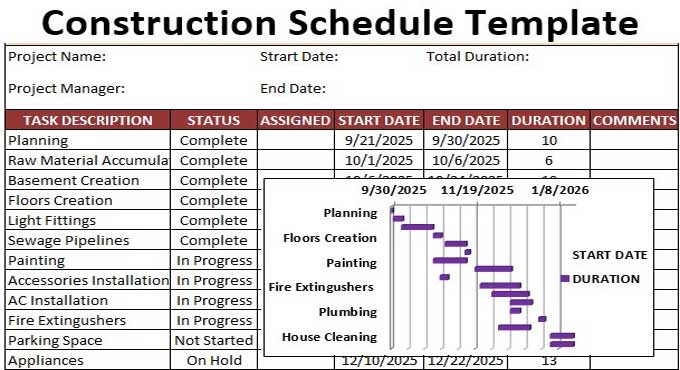
6 types of Scheduling for Construction Development Projects
Construction development projects are complex and require a lot of planning and coordination to ensure successful outcomes. It is essential that the project is done in an efficient manner, within the specified time frame, and within the budget allocated.
This requires careful planning and extensive research to ensure that the project is completed to the highest standards. It is important to carefully consider the exact requirements of the project, as well as the resources available, to create a project plan that can be successfully completed. At the same time, it is essential to remain flexible and open to changes that may be needed during the course of the project.
Define Construction Development Project
Construction development projects are projects that involve the construction or renovation of buildings, structures, and other physical assets.
These projects can range from small scale remodels to large scale new builds. The process of construction development involves a number of different steps that must be taken in order to successfully complete the project.
Planning
The first step is to develop a plan for the project. This includes researching the project site, assessing the needs of the project, and establishing a budget and timeline. Once a plan is in place, the project can move forward to the design phase. This phase includes designing the project, selecting materials, and determining the scope of the project.
Construction Scheduling
Construction schedules are required for all projects, with the exception of very simple and quick projects. For very complex programs, computerized critical path method versions are available in Project, as well as handwritten lists of essential tasks and deadlines. The schedule should be updated at least once a month until the job is completed.
Tracking Procurement
In addition, supply chains continue to pose challenges. Contractors can track all procurement steps of every important manufactured product, such as light fixtures, mechanical equipment, electrical gear, roofing, and carpet, if not built within the construction schedule.
Many checks must be completed, including approval of submissions, placement of orders, shipment from the factory, arrival on site, installation, and delivery of records. Manufacturing order numbers & transportation lading records can track the procurement of monthly updates and reports.
Look Ahead Scheduling
When a project lasts for months or years, the foreman or superintendent should also prepare a 2 or 3 week look ahead schedule detailing the daily labor and coordination points during that time.
Construction Phase
The construction phase is the next step in the process of construction development. This phase involves the actual building or renovation of the project. This usually involves the hiring of contractors, the purchase of materials, and the coordination of labor.
Once the construction phase is complete, the project is ready for the final phase: completion and occupancy. This phase includes the inspection of the project to ensure that it meets all safety and building codes, as well as the completion of any paperwork necessary to make the project officially complete.
Tracking Inspection
For projects requiring multiple tests or inspections for quality assurance, it is necessary to prepare tools that will coordinate and track approvals by relevant inspectors, such as municipal, manufacturer, and engineer, at each stage of the project. To ensure that the work will perform as expected, an integrated commissioning should be conducted. As construction approaches the inspection phase, these tools should be integrated into the schedule or maintained separately.
Wrapping it Up
Ultimately, success for a construction development project relies on effective planning and execution. The project must be completed on time, on budget, and to the highest standards. By taking the time to properly plan and research the project, and remaining flexible throughout the process, the project can be completed with the best possible results.
Generally, the longer and more complicated the project, the more advanced scheduling should be to ensure an on time completion. It is the seller's responsibility to prepare several schedules for the construction development project, as the buyer requests them. Multiple schedule types can be created and updated through completion depending on job complexity.
To get more details, watch the following video tutorial.
Video Source: Plan Academy Inc.
Download Construction Schedule Template


